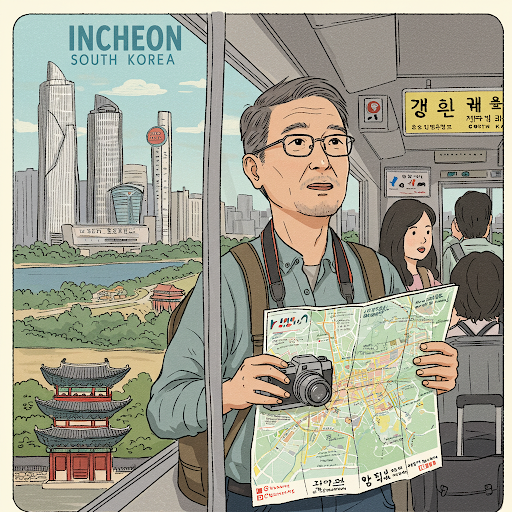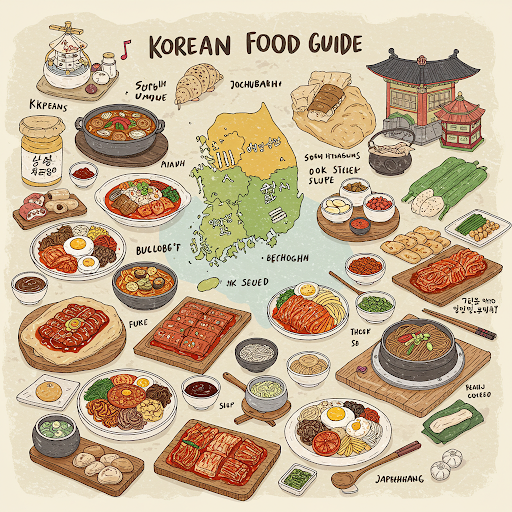Summary of Common Simple Korean Phrases for Travel in Korea

South Korea is a popular travel destination for foreign tourists, offering rich culture, food, and natural scenery. While most staff in major tourist areas in Korea can communicate in basic English, mastering some basic Korean phrases will make your trip easier and more enjoyable, and also show the locals your friendliness and respect. The editor has compiled a list of common Korean phrases that foreigners should know when traveling in Korea, categorized into several common situations, with Romanization and pronunciation for easier learning and reference.
1. Greetings and Polite Expressions

1.Hello/Good day: 안녕하세요 (An nyeong ha se yo / ㄢ ㄋㄧㄥ ㄏㄚ ㄒㄟ ㄧ ㄡ) — This is the most common greeting used in daily conversations.
Key word: 안녕 (An nyeong / ㄢㄋㄧㄥ) means "Hello"
2.Thank you: 감사합니다 (Gam sa ham ni da / ㄍㄢ ㄙㄚ ㄏㄚ ㄇㄧ ㄉㄚ) — A basic polite expression to show gratitude.
Key word: 감사 (Gam sa / ㄍㄢㄙㄚ) means "Thank you"
3.Sorry/Excuse me: 죄송합니다 (Joe song ham ni da / ㄗㄨㄟ ㄙㄨㄥ ㄏㄚ ㄇㄧ ㄉㄚ) — Used to apologize or get someone's attention.
Key word: 죄송 (Joe song / ㄗㄨㄟㄙㄨㄥ) means "Sorry"
4.Excuse me/May I ask: 실례합니다 (Sil lye ham ni da / ㄒㄧ ㄌㄧ ㄏㄚ ㄇㄧ ㄉㄚ) — Used when asking questions or interrupting someone.
Key word: 실례 (Sil lye / ㄒㄧㄌㄧ) means "Excuse me"
5.Goodbye (when leaving someone): 안녕히계세요 (An nyeong hi gye se yo / ㄢ ㄋㄧㄥ ㄏㄧ ㄍㄧ ㄟ ㄒㄟ ㄧ ㄡ) — Said to someone staying behind when leaving.
6.Goodbye (said to the person leaving): 안녕히가세요 (An nyeong hi ga se yo / ㄢ ㄋㄧㄥ ㄏㄧ ㄍㄚ ㄒㄟ ㄧ ㄡ) — A polite expression used when bidding farewell to someone who is leaving.
2. Shopping-related

1.How much is this?: 이거얼마예요? (I geo eol ma ye yo? / ㄍㄜ ㄛ ㄌ ㄇㄚ ㄧ ㄟ ㄧ ㄡ) — A common sentence to ask about the price of an item.
Key word: 얼마 (eol ma / ㄛㄌㄇㄚ) meaning: how much
2.Can you make it cheaper?: 조금깎아주세요. (Jo geum kka kka ju se yo. / ㄗㄨ ㄍㄥ ㄎㄚ ㄎ ㄚ ㄗㄨ ㄟ ㄧ ㄡ) — Used when haggling at a market.
Key word: 깎아 (kka kka / ㄎㄚㄎㄚ) meaning: to discount
3.I want this.: 이거주세요. (I geo ju se yo. / ㄧ ㄍㄜ ㄗㄨ ㄟ ㄧ ㄡ) — To indicate the item you want to buy.
Key word: 주세요 (ju se yo / ㄗㄨㄟㄧㄡ) meaning: please give me
4.Do you have a bigger/smaller one?: 더큰거/작은 거 있어요? (Deo keun geo / ja geun geo i sseo yo, ㄉㄜㄎㄣㄍㄜ/ㄗㄚ ㄍ ㄣ ㄍㄜ ㄧ ㄙ ㄜ ㄧ ㄡ) — When looking for items in different sizes.
Key word: 큰거 / 작은거 (keun geo / ja geun geo, ㄎㄣㄍㄜ / ㄗㄚㄍㄣㄍㄜ) meaning: big / small
5.Can I pay with a card?: 카드돼요? (Ka deu dwae yo? / ㄎㄚ ㄉㄜ ㄉㄨ ㄟ ㄧ ㄡ) — To ask if you can pay with a credit card.
Key word: 카드 (Ka deu / ㄎㄚㄉㄜ) English: card meaning: bank card
3. Ordering and Eating

1.Can I have the menu?: 메뉴좀주세요. (Me nu jom ju se yo. / ㄇㄟ ㄋㄩ ㄗㄨ ㄇ ㄗㄨ ㄟ ㄧ ㄡ) — Asking for the menu.
Key word: 메뉴 (Me nu / ㄇㄟㄋㄧㄨ) means "menu."
2.Please recommend something.: 추천해주세요. (Chu cheon hae ju se yo. / ㄘㄨ ㄑㄩㄣ ㄏㄟ ㄗㄨ ㄟ ㄧ ㄡ) — Asking the staff to recommend a dish.
Key word: 추천 (Chu cheon / ㄘㄨㄑㄩㄣ) means "recommend."
3.Is this spicy?: 이거매운거예요? (I geo mae un geo ye yo? / ㄧ ㄍㄜ ㄇㄟ ㄨㄣ ㄍㄜ ㄧ ㄟ ㄧ ㄡ) — Asking if the food is spicy, especially useful for those who can't handle spice well.
Key word: 매운 (mae un / ㄇㄟㄨㄣ) means "spicy."
4.Please give me a glass of water.: 물한잔주세요. (Mul han jan ju se yo. / ㄇㄨ ㄦ ㄏㄢ ㄗㄢ ㄗㄨ ㄟ ㄧ ㄡ) — Asking for water.
Key word: 물 (Mul / ㄇㄨ) means "water."
5.Check, please.: 계산해주세요. (Gye san hae ju se yo. / ㄍㄧ ㄟ ㄙㄢ ㄏㄟ ㄗㄨ ㄟ ㄧ ㄡ) — Asking for the bill.
Key word: 계산 (Gye san / ㄍㄧㄟㄙㄢ) means "bill."
4. Transportation and Asking for Directions

1.Where is the subway station?: 지하철역어디예요? (Ji ha cheol yeok eo di ye yo? / ㄐㄧ ㄏㄚ ㄑㄜ ㄦ ㄧ ㄛ ㄎ ㄜ ㄛ ㄉㄧ ㄧ ㄟ ㄧ ㄡ) — Asking for the location of the nearest subway station.
Key word: 지하철역 (Ji ha cheol yeok / ㄐㄧㄏㄚㄑㄜㄦㄧㄛ) means "subway station."
2.How do I get to this place?: 여기어떻게가요? (Yeo gi eo tteo ke ga yo? / ㄧ ㄛ ㄍㄧ ㄡ ㄊ ㄛ ㄎ ㄧ ㄍ ㄚ ㄧ ㄡ) — Asking for directions or transportation.
Key word: 여기 (Yeo gi / ㄧㄛㄍㄧ) means "here"
가 (ga / ㄍㄚ) means "go"
3.How long does it take to get here?: 여기까지얼마나걸려요? (Yeo gi kka ji eol ma na geol lyeo yo? / ㄧ ㄛ ㄍㄧ ㄎ ㄚ ㄐㄧ ㄛ ㄌ ㄇㄚ ㄋㄚ ㄍ ㄛ ㄦ ㄌ ㄧ ㄡ ㄧ ㄡ) — Asking how long it takes to get to the destination.
Key word: 얼마나걸려 (eol ma na geol lyeo / ㄛㄇㄚㄋㄚㄍㄛㄦㄌㄧㄡ) means "how long."
4.Please call a taxi for me.: 택시불러주세요. (Taek si bul leo ju se yo. / ㄊ ㄞ ㄎ ㄒ ㄧ ㄅ ㄨ ㄦ ㄌ ㄜ ㄗㄨ ㄟ ㄧ ㄡ) — Asking someone to call a taxi.
Key word: 택시 (Taek si / ㄊㄞㄎㄒㄧ) means "taxi."
5.How much to the airport?: 공항까지얼마예요? (Gong hang kka ji eol ma ye yo? / ㄍㄨ ㄥ ㄏ ㄤ ㄎ ㄚ ㄐㄧ ㄛ ㄌ ㄇㄚ ㄧ ㄟ ㄧ ㄡ) — Asking how much the taxi fare to the airport is.
Key word: 공항 (Gong hang / ㄍㄨㄥㄏㄤ) means "airport"
얼마 (eol ma / ㄛㄌㄇㄚ) means "how much."
5. Accommodation and Asking for Help

While staying in hotels or guesthouses in Korea, the following phrases are very useful:
1.Do you have any rooms available?: 빈방있어요? (Bin bang i sseo yo? / ㄅㄧ ㄣ ㄅㄤ ㄧ ㄙ ㄜ ㄧ ㄡ) — Asking if there are any available rooms.
Key word: 빈방 (Bin bang / ㄅㄧㄣㄅㄤ) means "vacant room."
2.What’s the Wi-Fi password?: 와이파이비밀번호뭐예요? (Wi-Fi bi mil beon ho mwo ye yo? / ㄨ ㄚ ㄧ ㄈ ㄞ ㄅㄧ ㄇㄧ ㄦ ㄅㄣ ㄏㄛ ㄇㄨ ㄛ ㄧ ㄟ ㄧ ㄡ) — The most common question after checking in.
Key word: 비밀번호 (bi mil beon ho / ㄅㄧㄇㄧㄦㄅㄣㄏㄛㄇㄨㄛ) means "password."
3.Can you help me?: 도와주세요. (Do wa ju se yo. / ㄉㄡ ㄨ ㄚ ㄗㄨ ㄟ ㄧ ㄡ) — Asking for help.
4.I’m lost.: 길을잃었어요. (Gi reul i leo sseo yo. / ㄍ ㄧ ㄦ ㄦ ㄧ ㄌ ㄛ ㄙ ㄜ ㄧ ㄡ) — Saying you are lost and asking for help.
Key word: 길 (Gi reul / ㄍㄧㄦ) means "road."
5.Call the police/ambulance!: 경찰불러주세요! / 구급차 불러주세요! (Gyeong chal bul leo ju se yo! / Gu geup cha bul leo ju se yo! / ㄍ ㄧ ㄡ ㄎ ㄔ ㄚ ㄦ ㄅ ㄨ ㄌ ㄜ ㄗㄨ ㄟ ㄧ ㄡ / ㄍ ㄨ ㄍ ㄜ ㄔ ㄚ ㄅ ㄨ ㄌ ㄜ ㄗㄨ ㄟ ㄧ ㄡ) — Using in emergency situations.
Key word: 경찰 (Gyeong chal / ㄍㄧㄡㄎㄔㄚㄦ) means "police"
구급차 (Gu geup cha / ㄍㄨㄍㄜㄔㄚ) means "ambulance."
Tips: How to Use Korean More Effectively During Your Trip

- Speak Slowly: If you are unsure of your pronunciation, speak slowly and clearly, and try to use simple tones to express your meaning.
- Use Gestures: If there is a language barrier, using hand gestures and facial expressions can help others understand.
- Download a Translation App: Apps like Papago or Google Translate can quickly translate Korean and provide pronunciation references.
- Key Words: Korean pronunciation can be difficult, but as long as you pronounce the key words marked in the above sentences correctly (if needed, you can also show the sentence directly to the other person), they will almost certainly understand your meaning right away.
- Learn to Smile and Be Polite: Even if the language is not understood, a smile and polite phrases can bridge cultural barriers.
Note: Taiwanese phonetic symbols are designed for Mandarin Chinese, so there may be differences in tone or pronunciation details when marking Korean.
Conclusion
Being able to use the above simple Korean will make your trip to Korea smoother. Whether shopping, ordering food, or asking for directions, these phrases can handle most everyday situations. If you’re unable to speak them, you can always show the relevant sentences to the other person, and they’ll quickly understand your meaning! Have a great trip!




